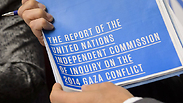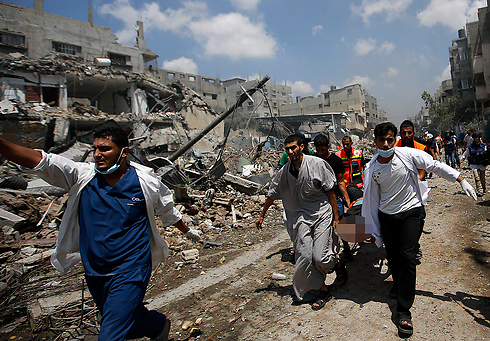
What war crimes did Israel commit in Gaza?
Op-ed: While world powers are exempted from investigation and punishment, and tyrant regimes in Africa and in the Middle East are reprimanded from time to time but don’t give a damn, Israel is stuck in a bad place in the middle.
War crimes compared to who? Compared to what? Compared to what Russia is doing in Ukraine? Compared to what the United States did in Iraq? In Afghanistan? Compared to what China is doing in Tibet?
I won't be revealing any exciting news to my readers if I say that the international community's investigation procedures are selective. World powers are exempted from investigation, exempted from punishment: Tyrant regimes, which destroy nations, in Africa and in the Middle East, are reprimanded from time to time, but don’t give a damn. Israel is stuck in a bad place in the middle.
In light of this reality, Judge McGowan Davis' report spares Israel. Yes, there was an excessive use of ammunition in many cases, disproportional damage to residential buildings, unnecessary killing of children and civilians, and in two cases a fire frenzy in order to prevent a soldier's abduction. But every decision maker in the international community knows that there is no practical way of waging military operations while keeping sterile, with zero flaws.

Like in other Western countries, the public opinion's sensitivity towards fallen soldiers, and the government and army's fear of losing the public opinion's support, increase the number of civilian casualties on the other side.
On Monday, after the report was published, sources in the Israeli government complained bitterly that the report made an analogy between Israel and Hamas. I'm not sure I understand them. When reports issued by international commissions of inquiry directed all their criticism at Israel, claiming that Israel was a sovereign state which is committed to international law, unlike its enemies in Gaza, those same sources complained that Israel was being discriminated against. Now, when a commission of inquiry on behalf of the United Nations makes an effort to balance its criticism, those same sources are complaining again.
The prime minister, the defense minister and the IDF commanders during Operation Protective Edge wanted to kill as many Hamas fighters and fighters of other terror organizations as possible. They were not thirsty for the blood of civilians in Gaza. On the contrary: The fear of a legal or diplomatic entanglement over unnecessary fire made them insist on warning procedures such as "roof knocking," waste sophisticated and expensive ammunition and keep fighter jets in the air for hours, all so as not to make a mistake.
Ironically, what made Hamas accept a ceasefire in the end was not the casualties among its fighters but the extent of damage in the civilian neighborhoods.
The problem with Operation Protective Edge was not the war crimes, but the fact that Israel found itself in a war. The Israeli government prevented the transfer of salaries to Hamas, prevented the transfer of goods and reinforced the siege on the Strip as much as it could. Had the government let into Gaza in 2014 everything it lets in today, there would have been no Protective Edge.
This is where the leaders' guilt lies. It also has to do with the management of the operation, the intellectual fixation, the slow movement, the fear of taking risks and the negligence in defending the soldiers and civilians near the border.
A number of lessons have been learned in the year that has passed since the operation. The secret Qatar-mediated negotiations with Hamas and the ease of the siege point to that. In addition, operational lessons have been learned in the sea, in the air and on the land.
But let us not delude ourselves: If and when another round is launched vis-à-vis Gaza, it won't be any different from the previous round, neither in the reports it generates nor in the feeling of pain, waste and missed opportunity it leaves behind.










